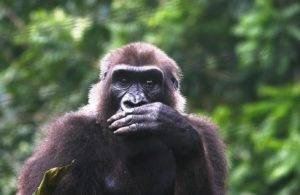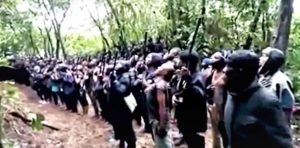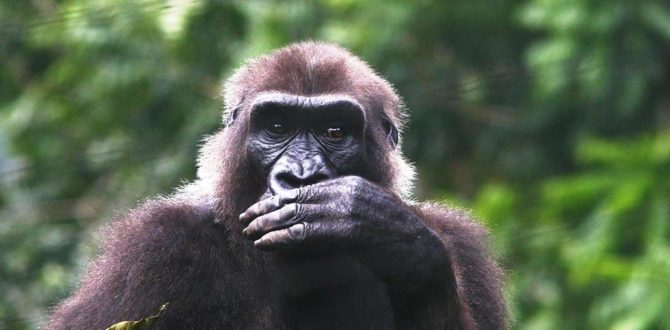Protected areas (national parks, game reserves, wildlife sanctuaries etc.), according to Article 25 of the 1994 forestry, fishery and wildlife law in Cameroon, are restricted from human interference, either partially or totally for biodiversity and natural resources conservation. In order to realize this goal, the Cameroon government pledged to ensure that permanent forests occupy at least 30% of the country’s total area. Though great strides have been made over the years with some eight protected areas created in the South West Region and a host of the others in North West, the Cameroon Government and most orgnaisations engaged in great apes conservation within these regions, seem to have retreated with the deepening Anglophone Crisis.

This has left the most endangered Africa primate, Cross River gorilla and other vulnerable/endangered species like the African elephant, Nigeria Cameroon Chimpanzee, pangolins, monkeys, francolin and others at the mercy of separatist fighters, who have also created camps in forests. Thousands of displaced persons seeking refuge in the forests are left with no option than harvest biodiversity species for consumption, irrespective of their conservation status.
Among the many protected areas, whose species have been left at the mercy of armed groups is the Kimbi-Fungom National Park (KFNP). KFNP is a 95000 hectares category two protected area, which cuts across Boyo, Donga Matung and Menchum divisions in the Northwest Region of Cameroon. This Park plays host to a wide range of emblematic species including the Nigeria Cameroon Chimpanzee, different pangolin, python and monkey species amongst others. Speaking a few months ago to with a Ph.D. research fellow carrying out survey within this area, he confirmed the presence of armed groups in this protected area. Meanwhile, the Conservator of the biodiversity hot spot told this reporter, last October 2018, that his team has not “accessed the park for the past six months.
Though other officials of the Ministry of Forestry and Wildlife working in different protected areas within the Northwest and South West Region refused to comment on how the Crisis is affecting wildlife conservation for fear of the unknown, it is clear that most have deserted their posts to safer areas in the country. The Lebialem Division of South West Cameroon, which is host to two key biodiversity hotspots with iconic species like the African elephant, Cross River gorilla, Nigeria Cameron Chimpanzees, Drills etc has for over nine months now been deserted by most wildlife conservation officials. In fact, most conservation stakeholders, who escaped to various destinations following an attack on the Senior Divisional Officer of Lebielem and the killing of the Lebialem Divisional Delegate of Land Tenure on March 22, 2018 have not gone back to their duty posts.

Research activities in most of these protected areas have equally been affected. A Ph.D. student in the University of Buea carrying comparative studies on the ecotouristic potentials of the North West and South West regions told this reporter recently that he has halted research for security reasons. These have left great apes and other biodiversity species at the mercy of adjacent communities, displaced persons, and armed groups, who will harvest just anything in their quest to survive, irrespective of the long-term repercussions.
Reacting to this status quo, the Sub-Director of Wildlife and Protected Area at the Ministry of Forestry and Wildlife, Njiang Antoine, said in an interview that conservation is very difficult during a crisis.
“When there is insecurity, there is definitely no security for human and wildlife. During social insecurity, our wildlife in protected areas are used as food, bushmeat; trees are cut down for wood and construction of huts by those that are refugees inside our protected area. As a conservationist, I know that when they will stay there for one week, they will not have anything to eat and will become poachers. What do you think will happen to our wildlife?” he questioned.
Mr. Njiang added that it is difficult to put down a strategy against those in the forests during a crisis because they are killing the animals not because they like it but because they want to survive. The Sub-Director of Wildlife and Protected Area at MINFOF underscored the need for the Government to dialogue with the people of the two English speaking regions of Cameroon to understand what they want and arrive at a consensus so the refugees and armed groups will leave the forests and the country’s biodiversity conserved.








it may not be essentially the most thrilling put up ever, but it surely is a crucial one